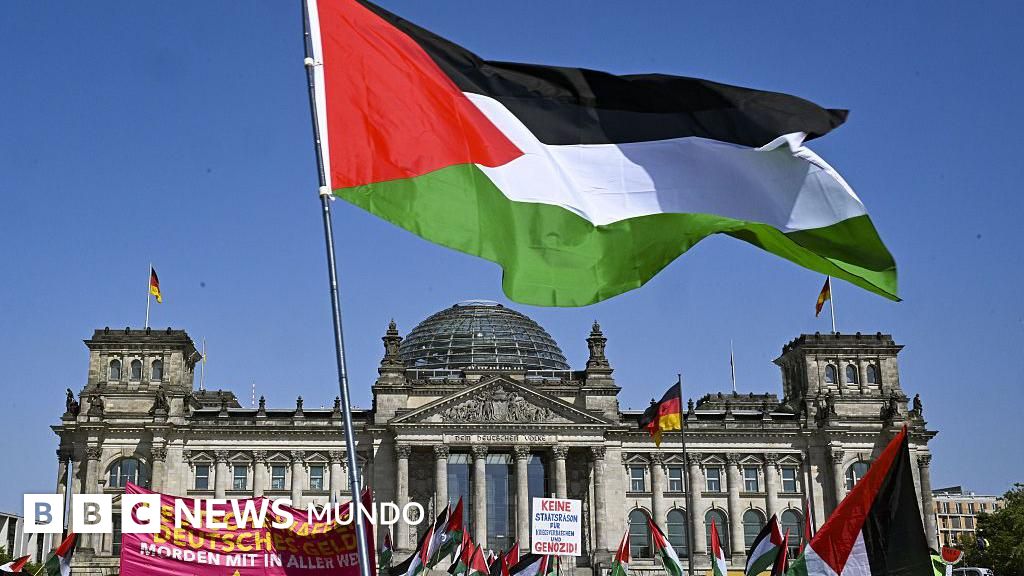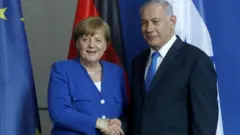

Image source, Getty Images
-
- Author, ATAHUALPA AMERISE
- Author's title, BBC News World
The right to the existence of Israel and its security is a reason of state for Germany, the best European friend of a country increasingly indicated by its military strategy in Gaza.
Germany supports Israel in international forums, it is its main commercial partner in the region, it maintains important military agreements and its official narrative directly links Israel's existence with the political and moral identity of Berlin.
This alignment does not respond only to strategic interests, but to a unique historical background: unlike other European countries, Germany's relationship with Israel is marked by the tragic memory of the Holocaust.
After the massacre of millions of Jews by the Nazi regime more than eight decades ago, Germany has acquired a commitment to the existence and security of the Israeli State, a commitment that the war in Gaza and especially the current famine are putting to the test.
While other European governments have intensified their criticisms of Israel, Berlin has maintained a more cautious position, especially in the first months of the conflict.
However, the deterioration of the humanitarian situation in the Strip, the famine that denounce international organizations and the growing accusations of war crimes against Israel have begun to raise doubts about a consensus that seemed unwavering.
“The German government is still Proisraelí, but we are seeing a change,” the sociologist Meron Mendel, director of the Anna Frank educational center in Frankfurt and author of the book tells BBC Mundo Speaking of Israel: a German debate.
Historical responsibility
The close relationship between Germany and Israel dates back to the mid -twentieth century, when the wounds of the Holocaust were recent and it was time to assume responsibilities.
In 1952, seven years after the end of World War II and four since the creation of the State of Israel, Germany signed with the latter the Luxembourg agreement, in which it promised to pay economic repairs for the crimes of the Nazi regime.

Image source, Getty Images
In addition to laying the foundations for the consolidation of the Israeli State, the decision opened a cooperation path that lasts until today.
For decades, however, that policy did not translate into an unconditional support: “If you observe the culture of memory in Germany from 1950 to the beginning of the 21st century, even when they looked at the past, they did not immediately think of Israel or Israeli politics,” says Meron Mendel.
He explains that the general perception of the Germans about the Jews and Israel linked more to “assume the past of the generation of the parents and commemorate the holocaust events.”
However, in 2008 there was a turning point when the then German Chancellor Angela Merkel declared before the Israeli Parliament that the security of Israel is part of the Staatsräson, or state reason, German.

Image source, Getty Images
This concept, which establishes an unconditional commitment to the existence and security of the Israeli State, was adopted as the governing principle of German foreign policy and has been endorsed by Merkel's successors: Olaf Scholz and Friedrich Merz.
Michael Brenner, history professor at the American University, tells BBC Mundo that “Germany feels a special responsibility to protect Israel when her security is threatened”, and quotes as an example the massacre of October 7, 2023 that gave rise to the current war in Gaza.
Brenner, author of eight books on the history of the Jews and their relationship with Germany, ensures that this commitment is not born of a feeling of guilt but of the principle of historical “responsibility” present in German political and academic discourse.
“After two or three generations, you can no longer talk about guilt. But the majority of the political elite is convinced that Germany must oppose anti -Semitism for its history,” adds political scientist Matthias Küntzel, a researcher at the Vidal Sassoon Center in Jerusalem and a member of the German Foreign Affairs Council.
Experts argue that support for Israel plays a symbolic role in contemporary German political identity as a demonstration that the country has learned from its past.
Mendel explains that this policy “became a kind of consensus, from the extreme left to the extreme right, throughout the German political spectrum.”
Economic, military and diplomatic alliance
While history is the determining factor, the relationship between Germany and Israel is based on a strategic basis that also encompasses the economy, defense and diplomacy.
The German State is today the main commercial partner of Israel within the European Union, with an exchange that includes technology, innovation, infrastructure and scientific cooperation.
In recent years, Germany has covered almost 20% of Israel's total trade with the European Union, which places it first well above other countries of the block such as France or Italy.
And in defense, the German country is the second largest armament supplier in Israel after the United States, with shipments that include submarines, air defense systems or technology for tanks.
From Hamas's attack in October 2023, Berlin has supplied armament to his ally worth about US $ 500 million, according to the newspaper Financial Times.

Image source, Getty Images
For its part, Israel also obtains important weapons sales contracts to Germany, such as the Arrow 3 antimile system, acquired by Berlin at a cost of about US $ 3.5 billion.
In addition to trade and defense, the link also extends to intelligence and diplomacy: both countries cooperate in multilateral organizations such as the UN and the EU, where Germany usually aligns with Israeli positions or acting as counterweight to international criticisms.
They also maintain numerous educational and cultural programs, from twinnings between cities to youth and academic exchanges.
For political scientist Matthias Küntzel, author of several books on anti -Semitism, the narrow bilateral link responds in part to the fact that Israel is a full democracy in the Middle East – a very unstable region – so Germany considers that its relationship has a strategic value against Iran and other regional actors such as Russia and China.
In any case, the historian Michael Brenner clarifies, although the geostrategic factor is important, “without the history of the Holocaust this cooperation would never have reached such depth.”
What changes with the war in Gaza

Image source, Getty Images
If there is something capable of testing Israel's strong German defense, it is the war in Gaza.
Some 60,000 Palestinians have died in the Strip in the last 21 months, according to the Gaza Ministry of Health, while international organizations alert a severe famine that raises the most vulnerable population.
According to figures from the Ministry of Health of Gaza, since the beginning of the war – after Hamas's attack against Israel on October 7, 2023 – 147 people have died in that territory, including 88 children, for causes attributable to malnutrition.
While Berlin has maintained his support for Israel in the main international forums, movements that suggest a posture change begin to be observed.
Germany did not adhere to the statement presented last week by 28 countries – among them the main European states – that flatly demands Israel to stop war in Gaza.
However, he presented together with the United Kingdom and France a joint text to request the Government of Benjamin Netanyahu to put an end to “the humanitarian catastrophe”, considering that “retaining essential humanitarian aid so that it does not reach the civilian population is unacceptable.”
“We urge the Israeli government to immediately lift the restrictions on the flow of aid and urgently allow the UN and the Humanitarian NGOs to carry out their work to combat famine. Israel must fulfill its obligations by virtue of international humanitarian international law,” says the statement.
The Netanyahu government denies being blocking the food distribution and, on the other hand, has criticized the UN for not collecting and transporting the food that is on the Gazatí side of the border on a timely manner waiting to be distributed. The UN rejects these accusations and points out that the aid flow depends on Israel, which is the one who has control of the territory.
In Germany, criticism of Israel were already emerging recently within the coalition to which the government of conservative Friedrich Mertz belongs, in which some voices have even spoken of “war crimes.”
The historian Michael Brenner emphasizes that, “while the Democristians – the majority partner of the government and the party of the Minister Merz – are reluctant to openly join other Western countries that ask for the end of the war, the social democrats – the minority – are more critical of Israeli politics in Gaza and want to limit or end the exports of German weapons to Israel.”
“Both the Foreign Minister and the Foreign Minister belong to the Democristians, but I think that they will even end up criticizing at some point the continuation of the Israeli war in Gaza,” predicts.
According to Meron Mendel, “the concept of Staatsräson, the reason of state, of solidarity with Israel, is staggering.”
The director of the Anna Frank educational center states that “German citizens, like other European populations, cannot understand why Israel acts as it does; even people who before the war were more or less on the side of Israel, are now very disturbed by the situation.”
The tension is noted in the streets: last week a proportional demonstration toured the center of Munich, taking hundreds of Jews and supporters to form a human chain to protect the main synagogue.
Shortly before, an Israeli restaurant in Berlin canceled its opening after intense protests of a Palestinian group.

Image source, Getty Images
The evolution of the war in Gaza and the humanitarian situation of the Palestinians could condition the German politics towards Israel in the coming months.
“I do not believe that the principle of the Staatsräson is going to disappear,” says Mendel, although it predicts that “if the war does not end, if the humanitarian situation in Gaza remains or becomes even more catastrophic, there will be a change in Germany's policies.”
Brenner, on the other hand, highlights the “imbalance between the support that the Government provides to Israel and political opinion in Germany, much more critical of the Israel War in Gaza”
“If this continues to grow, especially among a younger generation of politicians, there could be a change of course,”

Subscribe here To our new newsletter to receive every Friday a selection of our best content of the week.
And remember that you can receive notifications in our app. Download the latest version and act.





